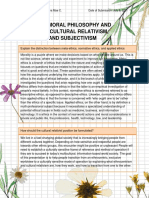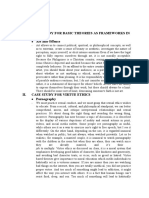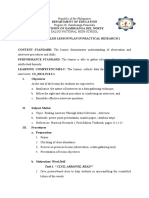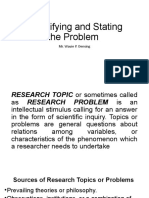Final Exam / Ethics
Final Exam / Ethics
Uploaded by
Vanessa GoldieCopyright:
Available Formats
Final Exam / Ethics
Final Exam / Ethics
Uploaded by
Vanessa GoldieOriginal Description:
Original Title
Copyright
Available Formats
Share this document
Did you find this document useful?
Is this content inappropriate?
Copyright:
Available Formats
Final Exam / Ethics
Final Exam / Ethics
Uploaded by
Vanessa GoldieCopyright:
Available Formats
Vanessa Gold
Final Exam / Ethics
A Rights (negative, positive) What are rights? The definition of rights can be divided
into a right holder and a right observer. A right holder is a permission to act; holding or
having a right may entitle responsibility. A right observer is a right that imposes a duty or
obligation. Rights can be inherent or give to us by law. Negative rights are those that are
inherent to us. They cannot be granted or denied by government. They cannot be
interfered with. They are also referred to as non-interference rights. Examples of these
are the right to freedom, private property, and pursuit of happiness, liberty, and health.
Positive rights are rights that are granted, usually by law. They are rights enjoyed by
consensus and not unlimited. Some examples of these are welfare, financial aid, and any
form of government assistance.
B Why is it difficult to ascribe animal rights? This is a difficult concept because our
rights are based on the concept of humans. Humans are given rights based the following
criteria, being born human, having rationality, having the ability to feel, autonomy to
make choices, having a conscience being self, and having projects. You cannot apply
these criteria to animals. This also brings up the question, where do you draw the line?
If we give animal rights, where do we draw the line? Does stepping on an ant then
become a crime? Which animals are protected? Which animals do we deem worthy of
protection? And who decides? This does not mean we should treat animals as things,
there should some guidelines in regards to the worldwide treatment of animals, still
keeping the respect the difference in attitudes towards animals in all cultures, however to
give them rights as we have, would be impossible.
C If you make human rights natural, which argument would you provide? I would
go by Lockes idea that these rights are built in, they are ours. They are given by nature,
inherent within us, and they are negative, and therefore they cannot be made positive by
law because negative rights cannot be granted or denied by law. Human rights are based
on the fact that we are human, based on the criteria described in question B, and because
of these criteria, all human rights are in fact natural.
D What is the difference between separatism, supremacism, integrationism, pluralism?
A separatist can be broken down into two categories, the limited separatist, and the
separatist. The separatist acknowledges that all groups need to remain separate, while the
limited separatist allows for some integration on a limited basis that stresses the needs for
cultural identity. This is close in position to the integrationist, who advocates integration
while still maintaining the ability to see separate parts. The moderate integrationist wants
to integrate with restrictions. The Pluralist acknowledges all and lives with diversity.
This position is more of a philosophical position then a cultural one. Lastly, the
supremacists are the most radical position. It is their belief that their ethnic group is the
best one regardless of the reason.
E What is the difference between respect and love? Respect is less involved. It is
altruistic and symmetrical. It involves observing personal freedoms and choices. Love is
more involved; it is a-symmetrical, and less altruistic. There is a personal involvement,
and therefore personal feelings and emotions cloud judgement. When you respect
someone, you can make observations and suggestions based clearly on their best
interests, for your only interest is what is best for the other person. When you are dealing
with love, you have your own best interests involved, since the level of involvement
dictates that decisions made by the other person will effect your life as well. Respect
gives you more space, but it also is less fulfilling. It is my belief that only out of respect
can healthy love develop.
F What is the difference between Kholberg and Gilligans gender theories? Kholberg
prescribes one set of stages of development, and holds both men and women to this
model. According to Kholberg because women cannot separate their personal feelings
from their moral development, therefore, they are deficient. Gillian states that this is
incorrect, that there needs to be two different stages of moral development for men and
women because we think differently. She believes that this separation of care
perspective over rights perspective does not make us morally deficient, just different.
This same difference allows women to see things in context. For example, according to
Kholberg, stealing is wrong, and to see it differently, would be morally incorrect.
However, according to Gillian, women see things in context. A woman might ask why
did the person steal? Perhaps the person had no money and had a child who needed
medicine, so the person resorted to stealing. Would this still be wrong? Stealing is in
fact wrong, but in the context, could we still see this person as wrong?
G In what sense the communitarian argument creates a tension between the
embeddedness and the freedom of the individual? According to communitarism, what is
right is what the community sets forth as being right. An individuals sense of self is
embedded in a community. Each freedom is subject to an evaluation of the community.
This would create a tension between personal feelings of freedom, and those set by the
community. One example would be an individual who feels he has the right to play his
music loudly. According to the community, what is right, and what he should feel is right
is what is set by the community, so therefore, if the community has decided playing loud
music is wrong, then he too should see it as wrong. This would create a conflict here
because what the community sets may not always be what the individual sets for himself,
but he must follow the communitys guidelines and moral ideas, since personal rights are
to be embedded with the community.
You might also like
- MATHONGA by Cheryl ZikhaliDocument1,335 pagesMATHONGA by Cheryl ZikhaliThandoNo ratings yet
- Man As A Moral AgentDocument3 pagesMan As A Moral AgentXytus100% (1)
- Freedom As A Foundation of EthicsDocument3 pagesFreedom As A Foundation of EthicsGrant Jomar SiadorNo ratings yet
- ETHICS by - TimbrezaDocument13 pagesETHICS by - TimbrezaHNo ratings yet
- Ethics By: Dr. Florentino TimbrezaDocument13 pagesEthics By: Dr. Florentino TimbrezaGervie Manguiat100% (1)
- Mid TernDocument13 pagesMid TernRevy CumahigNo ratings yet
- Lesson 1 Fundamental Concepts in Ethics Part 3Document39 pagesLesson 1 Fundamental Concepts in Ethics Part 3DACANAY, SHAMER D.No ratings yet
- Deontology& Other StoriesDocument10 pagesDeontology& Other Storiesnicodemuskiptoo8No ratings yet
- Week2 LectureNotesDocument16 pagesWeek2 LectureNotesSreejayaa RajguruNo ratings yet
- GEC 7 Chapter 1 Topic 4 Freedom As A Foundation of EthicsDocument3 pagesGEC 7 Chapter 1 Topic 4 Freedom As A Foundation of EthicsMichelle AntalanNo ratings yet
- Freedom As A Foundation of EthicsDocument3 pagesFreedom As A Foundation of Ethicseys100% (2)
- Edward E (1902-73) ), Schiller, Herder, Kierkegaard, and Others We Find A RecognitionDocument2 pagesEdward E (1902-73) ), Schiller, Herder, Kierkegaard, and Others We Find A RecognitionArthlin SapalaranNo ratings yet
- Ethical Requirements: Prepared By: Group 7Document26 pagesEthical Requirements: Prepared By: Group 7Maica A.No ratings yet
- Ethics Midterm CoverageDocument38 pagesEthics Midterm CoverageLEAH HURTADANo ratings yet
- Aristotle and KantDocument4 pagesAristotle and KantMC RailNo ratings yet
- Chapter 4 Lesson 1 Ethical RequirementsDocument11 pagesChapter 4 Lesson 1 Ethical RequirementsRevy CumahigNo ratings yet
- Ethics Lesson 3-5Document13 pagesEthics Lesson 3-5ALEINE LILAC LAMBANNo ratings yet
- Ethics Intro Lesson 5 Moral Persons PDFDocument8 pagesEthics Intro Lesson 5 Moral Persons PDFMaria ThereseNo ratings yet
- Ethics NotesDocument30 pagesEthics NotesRoman CarlosNo ratings yet
- Acha Patricia Noraie Reflection Week 2Document2 pagesAcha Patricia Noraie Reflection Week 2Patricia Noraie AchaNo ratings yet
- Mohd Zahid Bin Halim - 54213119193 - Assignment 2Document5 pagesMohd Zahid Bin Halim - 54213119193 - Assignment 2zahidNo ratings yet
- Notes 230126 094637Document8 pagesNotes 230126 094637Venus MercadoNo ratings yet
- A Moral Theory of Free WillDocument14 pagesA Moral Theory of Free Willmysterix01No ratings yet
- The Ethical Concepts and Problems in Filipino Values ContextDocument5 pagesThe Ethical Concepts and Problems in Filipino Values ContextLea RemorozaNo ratings yet
- CFE 102 - Quiz 1, 1st TermDocument2 pagesCFE 102 - Quiz 1, 1st TermMarklein DumangengNo ratings yet
- Compare and Contrast The Two Kinds of Moral PersonDocument3 pagesCompare and Contrast The Two Kinds of Moral PersonJoeMar LlaveNo ratings yet
- Ethics (Gec 7) 1 SEM 2021-2022Document26 pagesEthics (Gec 7) 1 SEM 2021-2022Alyn Cabañal AlmazarNo ratings yet
- Review 207Document23 pagesReview 207api-247377745No ratings yet
- Ethics Ssssss SssssssssDocument12 pagesEthics Ssssss SssssssssgirmasNo ratings yet
- Chapter 4-Lesson 1Document13 pagesChapter 4-Lesson 1Jath LeviNo ratings yet
- Addendum Number 2 For Module 1Document3 pagesAddendum Number 2 For Module 1Camille Rose B RamosNo ratings yet
- Morality NotesDocument2 pagesMorality NotesajayNo ratings yet
- Chapter 5: Moral Philosophy and Reasoning, Cultural Relativism, Skepticism and SubjectivismDocument3 pagesChapter 5: Moral Philosophy and Reasoning, Cultural Relativism, Skepticism and SubjectivismShaira MaeNo ratings yet
- Virtue, Right, Duty of VEDocument22 pagesVirtue, Right, Duty of VEHarshil DaveNo ratings yet
- Accepting Differences and Embracing DiversityDocument3 pagesAccepting Differences and Embracing DiversityRaniel John Avila SampianoNo ratings yet
- ETHICS Quizzes - CompilationDocument13 pagesETHICS Quizzes - CompilationmamalapatalfNo ratings yet
- Sp. Eng - Day 3Document5 pagesSp. Eng - Day 3Ache NegomboNo ratings yet
- ETHICSDocument4 pagesETHICSKrizia G. SenajonNo ratings yet
- Act.2 EthicsDocument5 pagesAct.2 EthicsCrizzle EliveraNo ratings yet
- Ethics NotesDocument6 pagesEthics NotessvetusNo ratings yet
- Ge10 Ethics Module 3Document7 pagesGe10 Ethics Module 3Itsss ClarizzaNo ratings yet
- Moral Obligations To Distant OthersDocument6 pagesMoral Obligations To Distant OthersJonathan WhiteNo ratings yet
- Sir-NiñoDocument5 pagesSir-NiñoRaiza NufableNo ratings yet
- Is There Anything Wrong With SpeciesismDocument4 pagesIs There Anything Wrong With SpeciesismSamuel WinderNo ratings yet
- Action and Emotion Man Does An Act With Emotion and Feeling Not Like A Robot. in Doing This Act, Man Does Not Only EvokeDocument17 pagesAction and Emotion Man Does An Act With Emotion and Feeling Not Like A Robot. in Doing This Act, Man Does Not Only EvokeJerlyn LotoNo ratings yet
- Nandan Ethics Lec-4Document16 pagesNandan Ethics Lec-4S SinghNo ratings yet
- MODULE 2 - PalenciaDocument3 pagesMODULE 2 - PalenciaPatricia Marie PalenciaNo ratings yet
- Week 1 5 EthicsDocument14 pagesWeek 1 5 EthicsJohn bryan DuranNo ratings yet
- I. Case Study For Basic Theories As Frameworks in Ethics: Art and OffenseDocument3 pagesI. Case Study For Basic Theories As Frameworks in Ethics: Art and OffenseElyuNo ratings yet
- Ethics Notes 6, Week 11Document8 pagesEthics Notes 6, Week 11johncarlo ramosNo ratings yet
- Frankfurt School - Beyond Justice by Agnes HellerDocument8 pagesFrankfurt School - Beyond Justice by Agnes HellerChristian RamírezNo ratings yet
- Intfilo FinalsDocument10 pagesIntfilo FinalsMig SablayNo ratings yet
- Thesis StatementDocument4 pagesThesis StatementAlmeogene PahuyoNo ratings yet
- MetaethicsDocument6 pagesMetaethicsAlfonso Jhon Rence Lawrenz100% (1)
- DevianceDocument13 pagesDevianceEmmanuel Jimenez-Bacud, CSE-Professional,BA-MA Pol SciNo ratings yet
- Ethics Handout wk34Document7 pagesEthics Handout wk34kokero akunNo ratings yet
- PERF 01cDocument2 pagesPERF 01cloric callosNo ratings yet
- Psychology MockDocument28 pagesPsychology MockvinniemarroNo ratings yet
- REVIEWERDocument8 pagesREVIEWERshakaday ShokshokNo ratings yet
- Uncompromised: The Surprising Power of Integrity in a Corrupt WorldFrom EverandUncompromised: The Surprising Power of Integrity in a Corrupt WorldRating: 5 out of 5 stars5/5 (1)
- BUS 3301 - Discussion Forum Unit 7Document3 pagesBUS 3301 - Discussion Forum Unit 7AdilNo ratings yet
- Interview Lesson PlanDocument4 pagesInterview Lesson PlanMA. DIOFEL LACAYANo ratings yet
- The Effect of Violence and Competition Within Video Games and AggressionDocument6 pagesThe Effect of Violence and Competition Within Video Games and Aggressionleoxu821No ratings yet
- Memoir RubricDocument2 pagesMemoir Rubricapi-242419996No ratings yet
- BT 30 Test 30Document7 pagesBT 30 Test 30TiffieNo ratings yet
- SASHI DESHPANDE's "IF I DIE TODAY": A STUDYDocument21 pagesSASHI DESHPANDE's "IF I DIE TODAY": A STUDYClassic PrintersNo ratings yet
- Eng - Ethics Lec 2 PDFDocument24 pagesEng - Ethics Lec 2 PDFMonzer OmerNo ratings yet
- Assessment of Stress Related Issues and Coping Mechanisms QuestionnairesDocument4 pagesAssessment of Stress Related Issues and Coping Mechanisms QuestionnairesRoshin TejeroNo ratings yet
- Chapter VIIDocument11 pagesChapter VIIHannah PaceteNo ratings yet
- Assignment Career Planning & DevelopmentDocument9 pagesAssignment Career Planning & Developmentsabrina mahadiNo ratings yet
- Open Doors and Parallel Windows - Timbre, Gesture, and Affective Response in Electroacoustic MusicDocument13 pagesOpen Doors and Parallel Windows - Timbre, Gesture, and Affective Response in Electroacoustic MusicieysimurraNo ratings yet
- Lumet's Film Demonstrates That The System Is Fundamentally Flawed. Discuss.Document2 pagesLumet's Film Demonstrates That The System Is Fundamentally Flawed. Discuss.xxpandapatchxxNo ratings yet
- Case Study NovartisDocument4 pagesCase Study NovartisEileen EnriquezNo ratings yet
- The Transition Between Adolescence & AdulthoodDocument3 pagesThe Transition Between Adolescence & Adulthoodananya singhalNo ratings yet
- Lesson 3 in ResearchDocument16 pagesLesson 3 in Researchwauie densingNo ratings yet
- hg11 AsDocument4 pageshg11 AsMinalyn MendozaNo ratings yet
- Brain Tracy Ebook ListDocument4 pagesBrain Tracy Ebook ListdiyitNo ratings yet
- SELF ReflectionDocument10 pagesSELF ReflectionDenis MuindeNo ratings yet
- Characteristics of Entrepreneurs and Risk Taking: Bachelor Thesis Organization & StrategyDocument32 pagesCharacteristics of Entrepreneurs and Risk Taking: Bachelor Thesis Organization & StrategyADRIANO, Glecy C.No ratings yet
- Apprey2019 atDocument14 pagesApprey2019 atFlávioSagnoriNo ratings yet
- A Birth Chart ExampleDocument25 pagesA Birth Chart ExampleAna-Maria Bologan100% (1)
- Violent Video GameDocument3 pagesViolent Video GameAlex NyagaNo ratings yet
- Hersey-Blanchard Situational LeadershipDocument17 pagesHersey-Blanchard Situational LeadershipMaria Petre100% (4)
- Oral Communication DLL Week 8Document3 pagesOral Communication DLL Week 8annmarieamores03No ratings yet
- Armed Conflict and Conflict TransforationDocument18 pagesArmed Conflict and Conflict TransforationPrincess C. SultanNo ratings yet
- Cuizon - Strama - Final QuizDocument2 pagesCuizon - Strama - Final QuizRosefel Ann CuizonNo ratings yet
- Theory of Change PDFDocument16 pagesTheory of Change PDFJuliet KabahendaNo ratings yet
- Jay - Architect (INTJ) PersonalityDocument7 pagesJay - Architect (INTJ) PersonalitySandy NicNo ratings yet
- Lecture 3Document24 pagesLecture 3Giorgi KupatadzeNo ratings yet

























































































